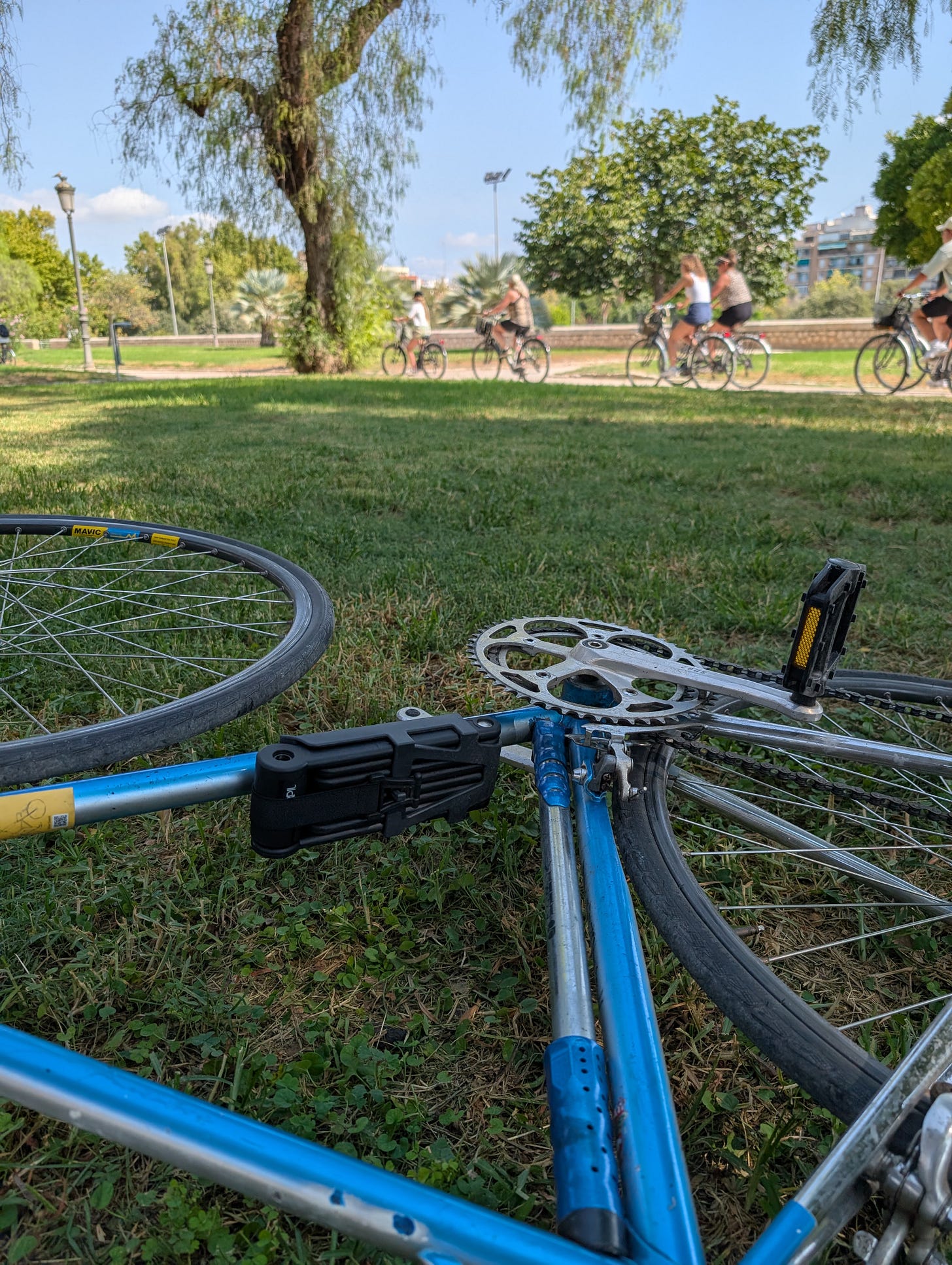Never Retire: What Happens When You Remove Hostility from Daily Life
In Spain, life feels different because the streets aren't angry
We’re in our eighth month living in Spain and have seen a grand total of zero public blow-ups.
No roadside screaming matches. No strangers in stores barking at each other over something trivial. Way fewer parents berating their kids. No simmering tension waiting to boil over.
Sure, once in a while a pedestrian shoots a glance at a driver who sneaks into a crosswalk, but that’s about as heated as it gets. And when something more confrontational does happen (like a tourist lady yelling at servers in a restaurant a few months ago or a mom or dad losing their patience with their offspring), it’s so rare that you notice it precisely because it’s not the norm.
In the U.S.—especially in L.A.—it’s the opposite. You step outside and you’re surrounded by spikes in the atmosphere:
A driver slams the steering wheel, mouth moving in silent rage behind the glass.
Two people at a checkout counter go from zero to shouting match over who was first in line.
The low-grade hum of danger at night that has you glancing over your shoulder without even thinking about it.
Here, that background noise is gone.
And because it’s gone, you realize how much of your own tension was just a reflection of everyone else’s.
This is not to say that I have turned into an anxiety-free being thanks to life in Spain. I am still me—often anxious—but no longer on high alert, particularly out in the streets. That shift alone makes me calmer in public and, more often than before, everywhere else.
You don’t have to try to live more calmly in Spain—it happens to you. The culture runs at a lower frequency. You fall into step with it without noticing.
A big part of that current is physical, not just cultural.
The calm isn’t only in people’s behavior—it’s built into the streets themselves.
When you’re not dodging speeding cars, searching endlessly for parking, or calculating the fastest driving route, your pulse naturally slows. And in Valencia, most of the city is set up for people on foot or bike. Wide sidewalks, dedicated bike lanes, plazas where cars can’t go. Streets narrow enough that drivers can’t—and generally don’t try to—dominate them.
You navigate at human speed here. That physical pace seeps into your mental pace.
When that edge disappears, you feel lighter—not in the “new age, manifest your best self” way, but in the physical, unshakable sense that you’re no longer living in such an antisocial place.
It’s like taking off a backpack you forgot you were wearing.
And once that weight’s gone, something interesting happens: you stop spending energy processing and defending against the tension. You start spending it on creating.
In Los Angeles, I could not have imagined waking up most days of the week, doing a little bit of work that actually accomplishes a lot, then going out to ride my bike how and where I see fit with little more than the normal safety concerns and zero compromises.
Valencia is built for human beings, not automobiles. And the environment this infrastructure fosters absolutely fuels motivation and creativity—practically and psychologically.
It’s not just that the surroundings are beautiful. It’s that the pace of life here leaves space for ideas. You’re not cramming thoughts between red lights or trying to hold onto them in traffic.
In Valencia, the city itself feels like it’s in on the project. The plazas, the bike lanes, the shaded corners where you can sit for an hour without being rushed. They’re not merely nice touches. They’re functional parts of daily urban life that quietly set the tone.
For me, that’s writing Never Retire, building Friki de Bici, and stitching together a way of working as it meets living that I can for the long haul. The calm here doesn’t just make life more pleasant—it makes it more possible.
Midlife is the perfect time to opt out of the noise. You’ve seen enough to know what drains you and what sustains you. You can stop pretending that stimulation is the same as energy—or that speed automatically equals progress.
Here, you don’t need a vacation to live with less friction. The structure of the city, the pace of the culture, and the absence of constant low-grade conflict create space you don’t have to fear.
That space becomes fuel—for work, for ideas, for a nervous system that’s less rattled, especially out in the streets.
You’re not just living in a place. You’re swimming in its current—and that current carries you toward the life you want, without you having to fight for calm through an underlying feeling of tension and hostility that often manifests itself as outright aggressive, if not deadly behavior.




Thank You. It's been just over a year since we've been in Spain. It's not always so easy to remember the calm we left back there. As we fix up the apartment to rent out, and continue to get rid of stuff, the home is looking really wonderful, calm and harder to leave. Then yesterday on the way to the pinball museum we shared the bus with a woman who needed some serious medication. She was screeming at me because Beyonce stole all of her lyrics and why was I in her neighborhood when all of her family had been removed two years ago. While I have compassion I was also afraid of what she might do. The city has less resources to take care of the people like her and the situation is getting worse. On top of that we have the regular pedestrians that you mention above.